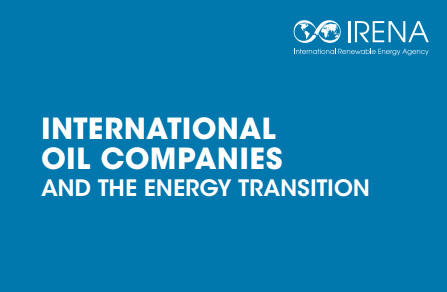Kategori : ELECTRICITY ENERGY NEWS, ENERGY AGENDA NEWS, OIL & FUEL SECTOR NEWS - Tarih : 14 March 2021
Climate change challenges and the rise of renewable energy sources are increasing the social and environmental pressure on oil companies to re-position themselves in the societies in which they operate. They have been doing this in a variety of different ways.
Firstly, some oil companies have continued with business as usual and are strengthening their current strategies of oil extraction to maximise profits. Secondly, other oil companies have switched to low carbon sources, such as natural gas, blue hydrogen and biofuels. Switching from oil to gas would result in fewer greenhouse gas emissions and greater efficiency, while biofuels are already being used to a large  extent (blended into petrol and diesel) but raise concerns regarding biodiversity effects and competing land use. Some oil companies are already using carbon capture and storage (CCS) for enhanced oil recovery, and are converting natural gas into hydrogen and capturing the CO2 released to produce a valuable fuel that could be used in home heating, industry and eventually ships and planes (Mills, 2019). Finally, other oil companies are, with different degrees of intensity and commitment, transitioning to renewable energy and related technologies, such as solar, wind, EVs and green hydrogen.
extent (blended into petrol and diesel) but raise concerns regarding biodiversity effects and competing land use. Some oil companies are already using carbon capture and storage (CCS) for enhanced oil recovery, and are converting natural gas into hydrogen and capturing the CO2 released to produce a valuable fuel that could be used in home heating, industry and eventually ships and planes (Mills, 2019). Finally, other oil companies are, with different degrees of intensity and commitment, transitioning to renewable energy and related technologies, such as solar, wind, EVs and green hydrogen.
This report addresses this question, by analysing and presenting oil companies’ clean energy strategies and investments, as well as climate targets. Results show that, despite the recent announcements of emission reduction targets and engagement in renewable energy projects, the companies’ actual investments in renewables are still low compared to those in fossil fuels. Oil companies are now competing with a mature renewable industry, which leaves them as small players without a competitive edge over renewable companies. Oil companies are also facing flat-to-declining oil demand, investor scepticism and public pressure on safeguarding the climate and environment. Moreover, the low oil prices of recent years serve as a reminder of the volatility of markets for oil – and other fossil fuels – and of the geopolitics associated with the current energy system. Many oil companies have woken up to this challenge and are actively developing new lines of business activity. The findings in this paper suggest more could be done, but the proposed adjustments are not in line with the expected energy transition needs.
Among the key decarbonisation tools now featuring high in countries’ priorities, there are a few options in which oil companies would have a competitive advantage:
– Hydrogen: This is an attractive fuel source, which can have different applications, such as for transport, heavy industry and power and heating, where established renewables (i.e. solar and wind)
cannot deliver the necessary heat. Hydrogen is one of the new markets in which oil companies could establish themselves thanks to their existing expertise in transporting and selling gas.
INTERNATIONAL OIL COMPANIES
– Offshore technologies: The oil and gas industries, which have operated offshore for more than half a century, could leverage synergies by transferring the knowledge acquired to the offshore wind industry (IRENA, 2020a). For example, they could upgrade existing infrastructure from the offshore oil and gas and shipping industries and convert it for offshore renewable energy technologies
(i.e., wind).
– Electrification: A key component of the energy transition is renewable electricity, which under IRENA’s climate-compatible scenario would become the dominant energy carrier. Some European oil companies are already entering the power sector, with aspirations of transitioning to electricity companies and playing a significant international role in the production and supply of renewable electricity. They have been pursuing this primarily by investing heavily along the electricity supply chain, namely in generation (from solar photovoltaics (PV) and onshore and offshore wind), as well as in electric vehicle (EV) charge points. While this is an interesting path, it comes with difficulties, especially as power systems become more complex and demanding to manage.
– Liquid biofuels: Many oil companies have already been investing in biofuels for decades, especially
through research efforts and venture capital spending. They have placed a bet on the continued demand for combustible fuels (Raval, 2019), particularly for modes of transport that so far cannot make extensive use of electricity (i.e., heavy trucks and airplanes). With many governments planning to phase out internal combustion engine vehicles, investments in liquid biofuels become strategic even in a context of low oil prices.
– Carbon Capture and Storage (CCS): This is a technology in which all oil companies are already
investing and could help them in keeping their businesses in the short-term in different ways.
1- Hydrogen produced from renewable energy
2- Hydrogen produced from fossil fuels combined with carbon capture and storage
This includes reducing emissions in their operations, reducing the carbon footprint, and especially driving new business lines, such as clean hydrogen production. This latter is quite important, as IRENA’s analysis foresees hydrogen playing a key role in the decarbonisation of the energy sector, with green hydrogen1 representing two thirds of the production and blue hydroge2 only one third. In the case of blue hydrogen, natural gas would still have a role to play and therefore CCS would be key for ensuring its clean production.
Source: Pls. Click to IRENA’s Report >>> – “International Oil Companies and The Energy” Transition





